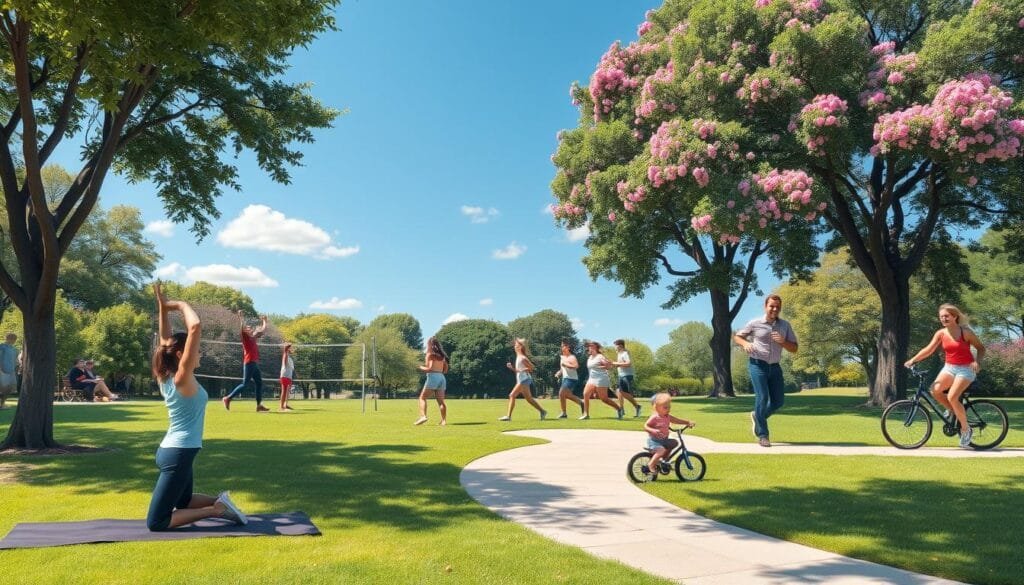Starting a health journey is like caring for a garden. It needs regular care and different things to grow well. A healthy lifestyle doesn’t pop up overnight. It grows from a mix of physical health and mental well-being. It’s all about choosing things that make the body and mind work well together. This leads to being totally well.
Doing things like exercising a bit more, eating colorful veggies, or being mindful helps plant seeds for staying healthy for a long time.
Making a pledge for better habits is about setting clear goals. Like quitting smoking, eating more greens, or going for a quick walk every day. Move towards your health goals one step at a time. You can track your progress easily.
This could be by noting what you eat or using apps to record your workouts. Remember, looking after your mind and feelings is just as crucial.
Key Takeaways
- Start with small, easy goals like working out three times a week or eating more veggies to build a lasting healthy lifestyle.
- Focus on one goal at a time to keep from getting overwhelmed. This way, you can easily see your progress.
- Looking after your mental well-being is key. Include time to relax and build a supportive circle for a full health experience.
- Keep a positive self-talk and be thankful. This helps improve how you feel about yourself and brings joy to your life.
- Choose fun physical activities, not just routine ones, to keep a strong commitment to your physical health.
- Balance your diet and make water your first choice drink to start the day right.
- Celebrate every health goal you reach. Each one is a big step in your journey to being completely well.
Establishing a Nourishing Diet
Starting a healthier lifestyle begins with choosing a nourishing diet. A diet full of nutrient-dense foods is key. It’s important to eat plenty of whole grains, fruits, vegetables, and drink lots of water.
The Importance of Whole Foods
Eating whole foods every day is essential. Leafy greens, nuts, and legumes are packed with vitamins and minerals. They also give you the fiber and protein your body needs. Choosing whole foods over processed ones helps avoid chronic diseases like heart issues.
Try to eat fish twice a week and fill half your plate with fruits and vegetables at every meal.
Limiting Processed Foods and Sugars
Many diets are half made up of ultra-processed foods. It’s important to eat less of these. They have too much sugar, salt, and fat. Choose low-fat dairy and less sugary drinks to cut down on bad calories and additives. Eat more protein-rich eggs, poultry, and fiber from grains like quinoa and oatmeal.
Hydration: The Role of Water in a Healthy Lifestyle
Water is vital for good health. It helps with digestion, circulation, and even getting rid of waste. Try to drink 6 to 8 glasses of fluids daily, focusing on water over sugary or caffeinated drinks. Staying hydrated helps your brain, energy, and overall well-being.
Choosing a balanced diet and less nutrient-poor food improves health and life quality. Eating lots of whole grains, fruits, vegetables, and drinking plenty of water keeps you healthy and energized.
Integrating Regular Physical Activity
Moving your body every day is key for good health. This can mean aerobic exercise, strength training, or stretching. It’s important to include these in your day.

The Benefits of Exercise on Physical and Mental Health
Being active is great for your body and mind. It helps build muscle strength and makes you feel happier. For example, activities like running or swimming boost brain chemicals. This makes you feel better and more energized. Exercise also helps you sleep well. Good sleep is vital for healing and staying healthy.
Moderate vs. Vigorous Exercise: Finding Your Balance
It’s important to know the difference between light and hard aerobic exercise. For good health, do light exercises, like fast walking, for 150 minutes a week. This is suggested by the U.S. Department of Health and Human Services. If you like harder workouts, then 75 minutes a week is enough. This can include running or aerobic dancing.
It’s also good to do strength training two times a week. This can include lifting weights or using resistance bands. It makes your muscles stronger and helps prevent diseases. It also helps your metabolism and muscle health.
Being active isn’t just about getting strong or looking good. It’s about a healthy, happy future. Physical activity can lower disease risk, improve mental health, and make life better.
The Significance of Mental Well-being
Mental stability deeply affects our overall health. Mindfulness and stress management are key. They help our mind and body work together well. This teamwork is vital for a happy life.
Mindfulness and Stress Reduction Techniques
More people are trying yoga and tai chi. From 21 million in 2010 to 33 million in 2023 practice yoga. Tai chi also grew in popularity, with nearly 4 million doing it. These activities reduce stress and make our mind and emotions stronger. This is good for our mental health.
Connection Between Mental Health and Physical Health
Mental health impacts our body in big ways. High stress can lead to serious depression and anxiety. It shows we need sound stress management.
Also, not sleeping enough makes mental problems worse. It shows how important it is to keep our mind and body in balance.
| Practice | Participants (2023) | Benefits |
|---|---|---|
| Yoga | 33 million | Enhances flexibility, reduces stress, improves mental health |
| Tai Chi | 4 million | Improves muscular strength, helps in pain management, fosters mental focus |
| Meditation | 14% of adults | Promotes relaxation, reduces symptoms of anxiety and depression |
Living a life that values both mind and body is key. Mindfulness, sleeping well, and activities like yoga and meditation help. They lessen stress’s effect on us and lead to a healthier life.
How to Live a Healthy Lifestyle
Making healthy choices is important. It’s about small, sustainable lifestyle changes. Each small change helps our well-being.
Starting with Small, Sustainable Changes
Starting with healthy habits means making simple changes. Like drinking more water or choosing healthier drinks. Getting enough sleep improves our health too.
For the best health, adults should sleep in a dark, quiet place. They should get about eight hours each night.

Creating a Personalized Health Plan
Success comes from a health plan that fits you. It should match your health needs and what you like. Here’s how to make your health plan:
| Health Focus | Actions | Goals |
|---|---|---|
| Nutrition | Adopt a plant-based diet rich in proteins and whole grains | Reduce risk of chronic diseases, manage weight |
| Physical Activity | Engage in activities like yoga, swimming, or walking | Enhance mental health, build physical strength |
| Mental Well-Being | Limit screen time, engage in stress management practices | Improve sleep quality, reduce anxiety |
Adding healthy lifestyle practices means not just stopping bad habits. It’s also starting good ones. Setting goals, tracking them, and overcoming challenges makes this journey rewarding.
Preventive Health Measures and Regular Check-ups
Ensuring regular health check-ups in today’s busy world is key to a healthy life. Dental check-ups and vaccine guidance help catch diseases early and manage health better.
Importance of Staying on Top of Health Screenings
Health screenings are crucial for finding health issues early. They can spot problems like hypertension, diabetes, and cancer before symptoms appear. This early detection can lead to successful treatment.
Screenings for ages and diseases, like breast and colon cancer, are vital. They find diseases early, which can help add healthy years to your life.
- Screening for cancer significantly improves outcomes through early detection
- Routine checks for blood pressure, cholesterol, and glucose levels can prevent cardiovascular diseases
- Understanding your family medical history can also guide personalized screening schedules
Vaccinations and Their Role in a Healthy Lifestyle
Vaccines are key in stopping diseases before they start. They make the immune system fight off infections, lowering the risk of getting sick or spreading diseases. Keeping up with vaccine guidance is crucial for everyone, including kids, adults, and seniors.
Vaccines like the flu and COVID-19 shots are important. They protect us and keep everyone healthier as a community.
- Annual flu vaccinations are recommended for all, starting from 6 months of age
- COVID-19 vaccinations are crucial for reducing severe disease risks, especially in people with pre-existing conditions
- Staying on schedule with childhood vaccines prevents common and serious illnesses

Mixing preventive measures with a healthy lifestyle boosts quality of life. Balanced eating, staying active, and managing stress matter a lot. Being proactive with dental check-ups, health screenings, and vaccine guidance leads to early detection and better health.
Conclusion
As we finish our look into living a healthy life, we remember how our choices matter a lot. Staying healthy matters for our long-term health and feeling good. The World Health Organization (WHO) says lifestyle affects our health by 60%. Eating well, staying active, keeping our mind healthy, and preventing diseases are key.
Changing what we eat and how we live can prevent gaining weight. People who eat lots of fruits and vegetables feel happier. This shows food choices are very powerful. Moving our body is also important. The American Heart Association suggests being active for 150 minutes each week. This makes us happier and healthier. Even short activities daily can make our lives better and longer.
Today, using mobile phones too much can make young people feel sad. Also, diseases from bad lifestyle choices are on the rise. This includes smoking too much or using medicine wrongly. We must focus on living well. By having good habits, taking care of ourselves, and being happy with others, we build a strong life. We all can learn how to be healthier and happier. Let’s use what we learn and make our lives better for a bright future.
FAQ
What are some core components of a healthy lifestyle?
A healthy lifestyle includes regular exercise and eating lots of whole foods. It’s best to limit sugar and alcohol intake. Managing your weight, taking care of your mental health, and getting regular check-ups are key too.
Why is it important to include whole foods in my diet?
Eating whole foods gives you essential vitamins, minerals, and fiber. They make your diet balanced, improve nutrient intake, and boost your health overall.
How can I reduce processed foods and sugars from my diet effectively?
Begin by checking labels for added sugars. Choose to cook at home instead of eating packaged food. Eat more whole grains, fruits, and veggies to cut down on processed foods.
How much water should I be drinking daily?
People should drink 8 to 13 cups of water a day. This varies by your age, sex, where you live, and how active you are. Drinking enough water helps your brain, heart, and more.
What are the mental benefits of exercise?
Exercise can lift your mood and give you more energy. It reduces stress and helps you sleep better. Staying active is great for your mental and physical health.
How do I differentiate between moderate and vigorous exercise?
Moderate exercise, like brisk walking, lets you talk but not sing. Vigorous activities, such as running, make it hard to chat because you’re working harder.
Can mental health practices really impact my physical well-being?
Yes. Mindfulness and stress reduction are good for your mental health and affect your body positively too. They help you manage stress better, which improves your overall health.
How do small lifestyle changes contribute to my health?
Small changes can make a big difference over time. Stopping smoking or drinking less alcohol boosts your health greatly. These changes support a healthy lifestyle.
What should a personalized health plan include?
Your health plan should match your health goals and life situation. It might have diet tips, exercise plans, ways to deal with stress, and a schedule for health checks.
Why are health screenings and vaccinations important?
Screenings help catch diseases early when they’re easier to treat. Vaccinations prevent many serious illnesses. Both are key for preventing disease and keeping you healthy.
How do vaccinations fit into living a healthy lifestyle?
Vaccinations fight off infections and diseases. They lower your risk of health problems and keep your immune system strong. This supports a healthy way of living.
